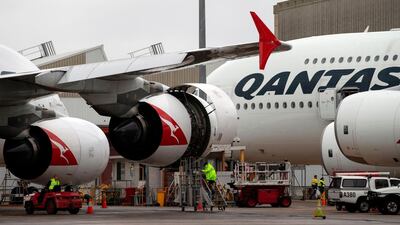Australia's Qantas Airways has challenged plane makers Airbus and Boeing to produce long-range jets by 2022 that are able to fly from Sydney to London or New York.
Ultra-long haul routes turned into a hot topic during the International Air Transportation Association (Iata) meeting in Sydney last week as airlines fretted over rising fuel costs threatening their profits.
The new generation of super-long haul jets, designed to fly between nearly any two points on the globe, will pose a challenge for the Middle East's hub model when they come into service in the next decade.
During the three-day meeting of international airlines, the industry expressed concern over the impact of fuel costs on profits, debated increasing air fares, discussed fuel hedging policies and promised to facilitate the participation of more women in the aviation sector.
Panel after panel of suited male executives talked of the importance of bringing more women into key positions in an industry that woefully lacks female representation, with some pointing to their own airlines' efforts towards gender equality.
Yet despite the marathon talks no concrete steps or specific targets were outlined to boost the number of women working in the industry.
_______________
Read more:
Qatar Airways chief executive criticised by Canadian travel minister over sexist remarks
Iata asks governments to release $5bn in airline revenues
_______________
On the last rain-soaked day of the Iata meetings, the participants' mood turned indignant after a Qatar Airways' boss Akbar Al Baker said his job would be too challenging for a woman to undertake.
Executives and journalists debated whether or not he was joking as the social media firestorm ensued.
Mr Al Baker, who was named chairman of Iata's board of governors, issued an apology the next day after criticism in global media.
The problem of gender inequality in the ranks of aviation executives is not new and is prominent in the Middle East where there is a lack of female chief executives in Arab airlines.
Only 3 per cent of global airline chief executives and 8 per cent of chief financial officers are women, according to a report by Iata in March.
The real test of progress for airlines, beyond stretching the range of aircraft or introducing ultra-luxurious first-class cabins, will be how they will leverage the pool of talented women who can benefit the business and encourage girls to opt for the necessary Stem (science, technology, engineering and mathematics) subjects in school.
Whether airlines stick to their vows to improve gender equality remains to be seen in the next Iata annual meeting scheduled next year in Seoul, South Korea.

